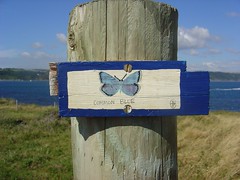 I’ve just spent the weekend in Looe, Cornwall, where my sister is summer warden at a nature reserve. Needless to say I’m very proud of her – while I’m jetting all over the place and quietly ruining the environment with emissions and server electricity consumption, she’s doing something to save it.
I’ve just spent the weekend in Looe, Cornwall, where my sister is summer warden at a nature reserve. Needless to say I’m very proud of her – while I’m jetting all over the place and quietly ruining the environment with emissions and server electricity consumption, she’s doing something to save it.
It’s interesting to note, though, how disparate centres for environmental biology are. If someone wants to look up soil pH in a particular location, for example, they’ve got to hope that it’s been published in a journal somewhere as part of some research. If something funny is happening to the population of a particular species of butterfly, they have to go through traditional written channels; it could take months to get a response, if they even get a response at all. This is one medium where a modified Elgg could make a difference.
Imagine if you added geo-specific data to all the standard Elgg elements. Suddenly, by searching on pH in a specific location range, you’d be able to find everything to do with pH in that area. If you looked for your butterfly species, you’d be able to find discussion, uploaded data, photographs and experts relating to that species. If there were nearby reserves or biology departments, you could restrict your search to those.
There are thousands of other specialisations where this kind of collaboration could become useful. Archaeology; medicine; law enforcement; agriculture; the arts. Elgg may be e-learning software, but learning isn’t just something that happens in schools.
Leave a Reply